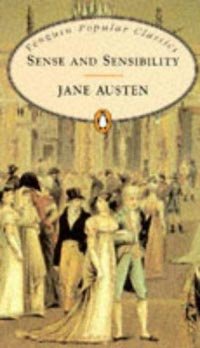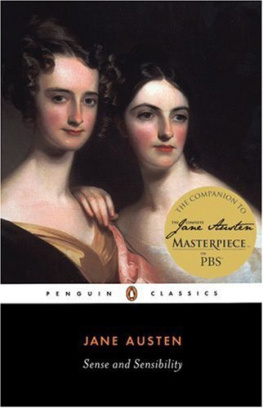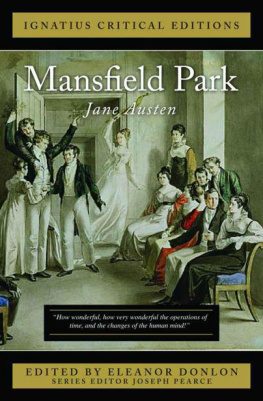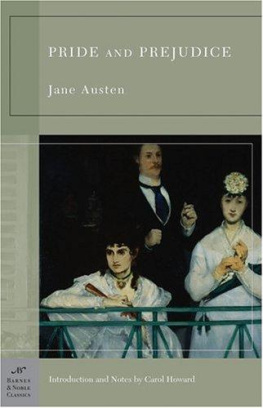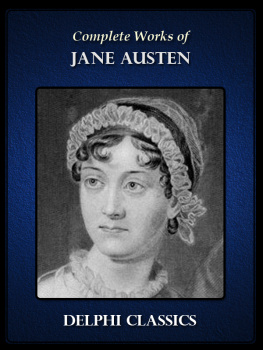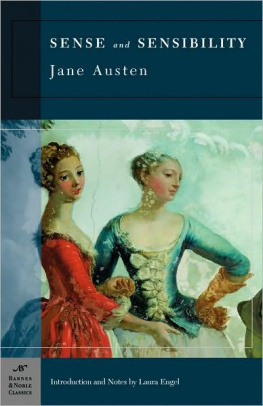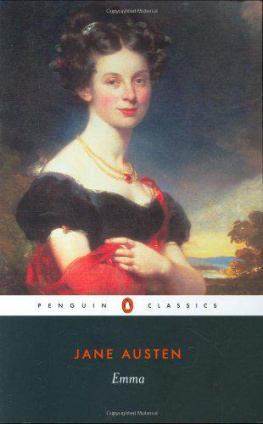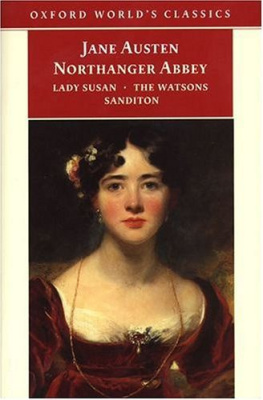
Table of Contents
From the Pages of Persuasion

Vanity was the beginning and the end of Sir Walter Elliots character: vanity of person and of situation. (page 4)
Always to be presented with the date of her own birth, and see no marriage follow but that of a youngest sister, made the book an evil; and more than once, when her father had left it open on the table near her, had she closed it, with averted eyes, and pushed it away. (page 7)
Half the sum of attraction, on either side, might have been enough, for he had nothing to do, and she had hardly any body to love. (page 25)
She had been forced into prudence in her youth, she learned romance as she grew olderthe natural sequel of an unnatural beginning. (page 29)
Personal size and mental sorrow have certainly no necessary proportions. A large bulky figure has as good a right to be in deep affliction, as the most graceful set of limbs in the world.
(page 65)
He was evidently a young man of considerable taste in reading, though principally in poetry; and besides the persuasion of having given him at least an evenings indulgence in the discussion of subjects, which his usual companions had probably no concern in, she had the hope of being of real use to him in some suggestions as to the duty and benefit of struggling against affliction. (pages 95-96)
A man does not recover from such a devotion of the heart to such a woman!He ought nothe does not. (page 173)
Even the smooth surface of family-union seems worth preserving, though there may be nothing durable beneath.
(page 187)
When one lives in the world, a man or womans marrying for money is too common to strike one as it ought. (page 189)
Men have had every advantage of us in telling their own story. Education has been theirs in so much higher a degree; the pen has been in their hands. I will not allow books to prove any thing. (page 221)
Dare not say that man forgets sooner than woman, that his love has an earlier death. I have loved none but you.
(page 223)
If I was wrong in yielding to persuasion once, remember that it was to persuasion exerted on the side of safety, not of risk. When I yielded, I thought it was to duty. (page 230)
It was, perhaps, one of those cases in which advice is good or bad only as the event decides. (page 232)
When any two young people take it into their heads to marry, they are pretty sure by perseverance to carry their point, be they ever so poor, or ever so imprudent, or ever so little likely to be necessary to each others ultimate comfort. (page 234)


BARNES & NOBLE CLASSICS
NEW YORK
Published by Barnes & Noble Books
122 Fifth Avenue
New York, NY 10011
www.barnesandnoble.com/classics
Jane Austen wrote Persuasion between August 1815 and August 1816. It was
published posthumously, along with Northanger Abbey, in 1817.
Published in 2003 with new Introduction, Notes, Biography, Chronology,
Inspired By, Comments & Questions, and For Further Reading.
This trade paperback edition published in 2004.
Introduction, Notes, and For Further Reading
Copyright 2003 by Susan Ostrov Weisser.
Note on Jane Austen, The World of Jane Austen and Persuasion,
Inspired by Persuasion, and Comments & Questions
Copyright 2003 by Barnes & Noble, Inc.
All rights reserved. No part of this publication may be reproduced or
transmitted in any form or by any means, electronic or mechanical, including
photocopy, recording, or any information storage and retrieval system,
without the prior written permission of the publisher.
Barnes & Noble Classics and the Barnes & Noble Classics
colophon are trademarks of Barnes & Noble, Inc.
Persuasion
ISBN-13: 978-1-59308-130-0 ISBN-10: 1-59308-130-8
eISBN : 978-1-411-43288-8
LC Control Number 2004100829
Produced and published in conjunction with:
Fine Creative Media, Inc.
322 Eighth Avenue
New York, NY 10001
Michael J. Fine, President and Publisher
Printed in the United States of America
QM
7 9 10 8 6
Jane Austen

The English novelist Jane Austen was born December 16, 1775, the seventh of eight children, in the Parsonage House of Steventon, Hampshire, where she spent her first twenty-five years. During her brief lifetime Austen witnessed political unrest, revolution, war, and industrialization, yet these momentous events are not the central subjects of her finely focused novels. Rather, Austen wrote of her immediate experience: the microcosm of the country gentry and its class-conscious insularity. Janes father, the Reverend George Austen, was the erudite country rector of Steventon, and her mother, Cassandra (nee Leigh), was descended from an aristocratic line of learned clergymen. By no means wealthy, the Austens nonetheless enjoyed a comfortable, socially respectable life, and greatly prized their childrens education.
Jane and her beloved elder (and only) sister, Cassandra, were schooled in Southampton and Reading for a short period, but most of their education took place at home. Private theatrical performances in the barn at Steventon complemented Janes studies of French, Italian, history, music, and eighteenth-century fiction. An avid reader from earliest childhood, Jane began writing at age twelve, no doubt encouraged by her cultured and affectionate family. Indeed, family and writing were her great loves; despite a fleeting engagement in 1802, Austen never married. Her first two novels, Elinor and Marianne and First Impressions, were written while at Steventon but never published in their original form.
Following her fathers retirement, Jane moved in 1801 with her parents and sister to Bath. That popular watering hole, removed from the country life Jane preferred, presented the sociable young novelist with a wealth of observations and experience that would later emerge in her novels. Austen moved to Southampton with her mother and sister after the death of her father in 1805. Several years later the three women settled in Chawton Cottage in Hampshire, where Austen resided until the end of her life. She relished her return to the countryside and, with it, a renewed artistic vigor that led to the revision of her early novels. Sense and Sensibility, a reworking of Elinor and Marianne, was published in 1811, followed by Pride and Prejudice, a reworking of First Impressions, two years later.
Austen completed four more novels (Mansfield Park, Emma, Northanger Abbey, and Persuasion) in the Chawton sitting room. Productive and discreet, she insisted that her work be kept secret from anyone outside the family. All of her novels were published anonymously, including the posthumous release, thanks to her brother Henry, of Northanger Abbey and Persuasion.
The last years of Austens life were relatively quiet and comfortable. Her final, unfinished work, Sanditon, was put aside in the spring of 1817, when her health sharply declined and she was taken to Winchester for medical treatment of what appears to have been Addisons disease or a form of lymphoma. Jane Austen died there on July 18, 1817, and is buried in Winchester Cathedral.
Next page

